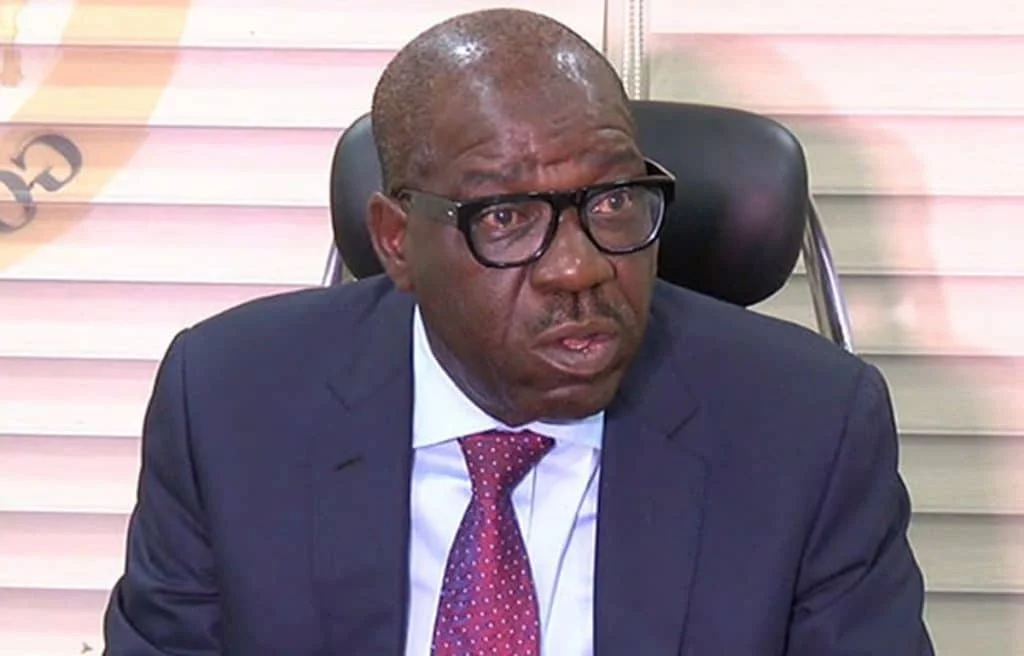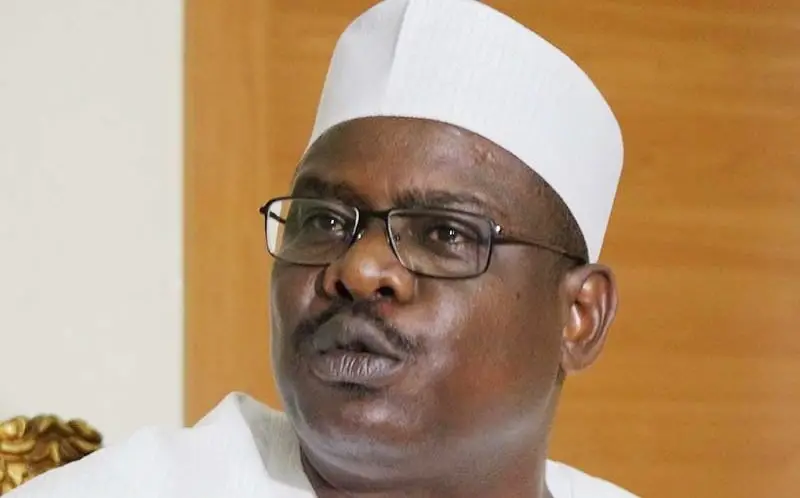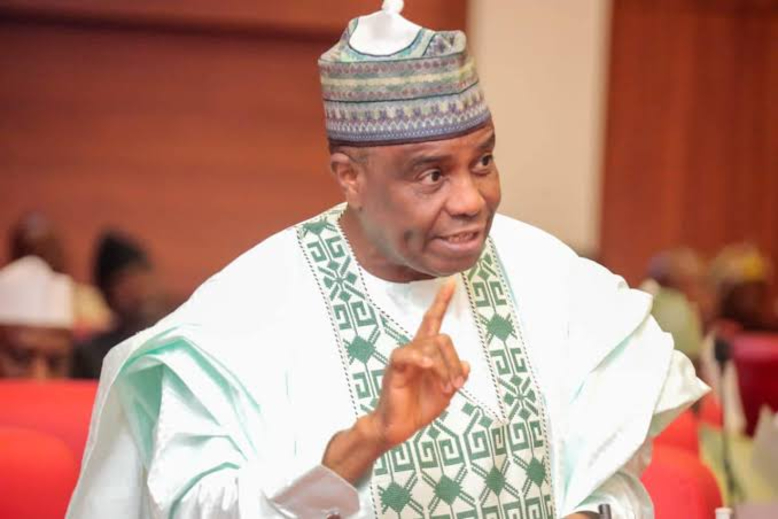News
COVID-19 Palliatives: Presidency, Ndume In Verbal War

…I Stand By My Submission- Ndume
… Prove Your Allegations Or Keep Quiet-Presidency
Following a reply by a presidential spokesman, Garba Shehu, to Senator Ali Ndume (Borno South),
the war of words between the Presidency the former Leader of the Senate may not end soon.
Ndume, had at a press briefing in Borno State, called for the immediate sack of COVID-19 Palliatives Measures Committee headed by the Minister of Humanitarian Affairs, Disaster Management and Social Development, Sadia Umar Farouq.
The APC Senator representing Borno South picked holes in the way and manner distribution of palliatives to Nigerians at this critical time of COVID-19 lockdown is being handled by the Humanitarian Affairs Ministry.
Ndume who kicked against the approach adopted by the Ministry in a chat with journalists said the emergency national assignment should be taken away from the Ministry and given to a fresh committee that will use governors of the 36 States as links of distribution across the federation.
READ ALSO: COVID-19: Warri-based Billionaire Pastor Doles Out N1.1billion Charity, Challenges Others To Give
His words, “My concern is the manner and the way the COVID-19 palliative measures provided by the president is being handled or executed. We have received numerous complaints and it is actually very unfortunate.
“In fact, left to me, I am strongly calling for the humanitarian committee headed by the minister of Humanitarian Affairs to be dissolved with immediate effect and the president should as a matter of urgency, form a taskforce that would deal with the issue of palliatives, headed by the military, police, civil defence, voluntary organisations, and the NYSC among others.
“It should be formed as taskforce committee headed by governor of each state, and those materials or cash be allocated and distributed house to house, instead of the fake or dubious way they have been handling the matter by just going to Television House or Government House to demonstrate.
“If you see a Minister or big person anywhere going personally to do something, then know that there is something wrong. If not, what has the Minister got to do with going from state to distribute palliative? They should be in the ministry monitoring the activities.
READ ALSO: Women Arrested For Raining Curses On Ogun Gov, Others
“While the pitiable situation of the poor is visible to everyone, few individuals are rushing to squander the money meant for the poor.
“We have reliable information that the names they generated are fake and that they connived with some of the banks to defraud the poor. It is better to stop the exercise because it is full of lies and if the president don’t do something to stop it now, we will end up investigating and later on going back and forward to the court.”
However, in his reply to Ndume’s claims, Shehu urged the Borno South senator to prove his claims instead of accusing unnamed faces in his latest attack.
In a statement issued on Friday in Abuja, the Presidency accused Ndume of politicising a national emergency and challenged him to name the alleged kleptocrats in Buhari’s government.
READ ALSO: Ken Saro-Wiwa’s Son Dies Of COVID-19 In UK
The SUN reports that Shehu in the statement, urged Ndume to keep quiet as according to him, no serious government changes a winning team in times of war.
The statement titled: ‘Senator Ali Ndume should figure out his mentioned kleptocrats around the President or be quiet’, reads in part, “Claiming that the COVID-19 Palliative Measures Committee is not functioning as it should be not the same as presenting proof for such a claim.
“No one replaces an institutional government body in the midst of the global pandemic without clear and irrefutable evidence that it needs replacing.
“A press briefing from a discontented politician is rarely the source of such evidence.
“At this difficult time of the battle by Nigeria against Coronavirus, everyone should help the fight and not seek to make political capital out of it, whatever his or her grievances.”
But in his reaction to the statement, Ndume said he stands by his observations and recommendations as far as distribution of palliatives arising from COVID-19 is concerned.
Ndume, who reacted through a telephone conversation, however, said he was not ready to join issues with anybody having made his observations known.
READ ALSO: Lockdown Claims More Lives In Nigeria Than Pandemic, As Security Personnel Kill Two More
“I’m not ready to join issues with anybody on palliatives distribution, having made my observations known based on information I got from the grassroots as a grassroots person. I’ve made my position known on the programme and I stand by it,” he said.
(SUN)
(PHOTO: File)
News
Ex-Edo Gov Obaseki Reacts As His Cousin Is Beaten, Stripped

The immediate past governor of Edo State, Godwin Obaseki, has reacted to the attack on Don Pedro Obaseki, the Chief Executive Officer of Osamudia Farms.
Don Pedro Obaseki, a cousin to the immediate past governor was attacked at Uwa Primary School where he went to play football.
In a viral video, Pedro Obaseki is seen kneeling at the Oba of Benin Palace gate, before he was dragged into the palace where he was asked to crawl before some chief walked up to the scene and rescued him.
Reacting, the ex-Edo governor described the act as a “grave violation of fundamental human rights and a reckless disregard for the rule of law.”
READ ALSO: Obaseki Beaten, Stripped In Edo
Obaseki, said: “I call on security agencies to immediately investigate this matter thoroughly and transparently, identify those responsible for this barbaric act and ensure they are held accountable in accordance with the law.
“A situation where thugs and non-state actors appear to freely take the law into their own hands on behalf of high-profile individuals and those in positions of authority can only result in one outcome, a degeneration into a state of anarchy, which will do no one no good.”
He further charged, “I urge human rights organizations, civil society groups, and all well-meaning Nigerians to lend their voices and speak out firmly against this injustice and gross violation of human rights.”
News
New Tax Laws: Suspend January 2026 Implementation — Senator Ndume Tells Tinubu

Former Senate Leader, Ali Ndume has appealed to President Bola Ahmed Tinubu to suspend the January 1, 2026, implementation of the country’s new tax laws amid growing controversy.
The federal lawmaker made the appeal in a statement he issued on Wednesday in Abuja.
This comes as the Nigerian Bar Association demanded the suspension of the implementation.
Recall that a member of the House of Representatives, Abdussamad Dasuki, had last week called the Parliament’s attention to alleged alteration to the tax laws.
READ ALSO:FIRS Confirms NIN As Tax ID
Chairman of the Presidential Fiscal Policy and Tax Reforms Committee, Taiwo Oyedele, in an interview on Arise Television on Wednesday, called for calm over claims of alterations in tax laws and urged Nigerians to allow lawmakers to complete their investigation before drawing conclusions.
Speaking on the ongoing controversy about the tax laws, Ndume noted that proceeding with the implementation without getting to the root of the alleged forgery will create a legitimacy challenge for the tax laws.
His statement read, “With the controversy surrounding it, the President should constitute a team to verify the veracity of the claim and act accordingly.
“As the responsive leader that he has always been, he should look at it to find out if the copy that was signed and the claim of alterations are genuine so that he will do the needful to bring the controversy to rest.
READ ALSO:US Threatens To Sanction Countries That Vote For Shipping Carbon Tax
“If not, the controversy will continue.” That is to say, the tax law will not be implemented, because you can’t build on nothing.
“So, Mr. President should suspend the implementation until the issues are resolved because so many civil society organizations, the Arewa Community, and the Nigerian Bar Association are saying that he should withdraw the tax law and investigate the allegation of forgery.”
“Therefore, Mr President should get to the root of the allegation of forgery. The small committee that will be set up should look into it while the House of Representatives does its own.”
News
Tambuwal Engages Security Agencies As US Airstrikes Hit Own LG In Sokoto

Senator Aminu Waziri Tambuwal, representing Sokoto South, has called on residents of Sokoto State to remain calm following reports of United States airstrikes targeting ISIS-linked terrorists on Christmas Day.
In a statement posted on his personal X account, the former Sokoto State governor said he was aware of reports concerning the airstrikes, which marked a direct US military action in Nigeria based on intelligence about ISWAP threats, and urged citizens to remain law-abiding while authorities clarify the situation.
“I have noted the reports concerning an airstrike carried out as part of ongoing counterterrorism efforts through cooperation between the federal government of Nigeria and the United States,” Tambuwal said. “I urge our communities to remain calm and law abiding as relevant authorities clarify the circumstances surrounding the operation.”
READ ALSO:US Dept Of War Shares Video Of Air Strikes In Nigeria
Tambuwal assured constituents that he was engaging with relevant security agencies to obtain full details of the operation and to ensure that necessary things were in place to protect civilians.
“I wish to assure the people of Sokoto South that I am in active talks with relevant security authorities to obtain full details and ensure that all necessary safeguards are upheld,” he added.
The senator emphasised that counterterrorism operations were aimed strictly at criminal and terrorist elements threatening public safety, not innocent civilians who are often victims of insecurity. He stressed that the protection of civilian lives must remain central to all legitimate security actions.
He further called on community leaders, traditional institutions and residents to work closely with security agencies by sharing credible intelligence and resisting misinformation capable of causing fear or heightening tension.

 News4 days ago
News4 days agoJUST IN: Kano Lawmaker, Sarki Aliyu Daneji, Dies Hours After Colleague’s Passing

 News4 days ago
News4 days agoFULL LIST: Churches That Don’t Celebrate Christmas

 Headline3 days ago
Headline3 days agoJUST IN: US Forces Bomb Terrorists Camps In Nigeria

 News3 days ago
News3 days agoOkpebholo Slams ₦25bn Libel Suit On Edo PDP Chairman

 Headline3 days ago
Headline3 days agoUS Dept Of War Shares Video Of Air Strikes In Nigeria

 Entertainment4 days ago
Entertainment4 days agoAFCON 2025: Davido Wins $96,000 After Super Eagles Beat Tanzania

 News5 days ago
News5 days agoOPINION: The Day Friendship Died

 News4 days ago
News4 days agoSheikh Gummi Sues Two Over Alleged False Facebook Publication

 News4 days ago
News4 days ago7 Health Risks Of Owning A Cat

 Headline4 days ago
Headline4 days agoCoup: Guinea-Bissau Junta Releases Six Held Opposition Politicians
































